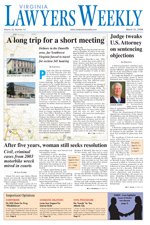Here’s one for the public-sector employment lawyers.
Those lawyers know that public employees have First Amendment rights and can sue employers who abridge those rights.
But the First Amendment only protects employee speech on matters of “public concern.” A lot of workplace speech can involve issues peculiar to that workplace and personal to that employee. It isn’t always easy to see when an employee crosses the line.
Even a case close to the line can result in qualified immunity for the defendant, the 4th U.S. Circuit Court of Appeals ruled last week. The “speech” at issue was of public concern but the defendants were off the hook because it wasn’t clear from existing case law that it was, the court said in Campbell v. Galloway (VLW 007-2-061).
Amy Campbell contended that she was fired from the Southern Pines, N.C., police force after she wrote a 13-page memo to the chief. Some of the complaints in the memo were clearly personal and peculiar to the police department—the male cops didn’t invite her to breakfast, for example—but other allegations of sexual harassment were another matter, the court said. Campbell cited one instance in which a male officer reached down Campbell’s pants to retrieve a gun and another in which a male officer required a female DUI suspect to use the toilet with the door open, even though Campbell was available to act as escort.
The 4th Circuit said that sexual harassment complaints are not “per se” a matter of public concern. But its decision in Campbell might be the type of case law that “clearly establishes” just what type of sexual harassment allegation is a matter of public concern and make qualified immunity a more difficult plea to sustain.
Subscribe to:
Post Comments (Atom)

No comments:
Post a Comment